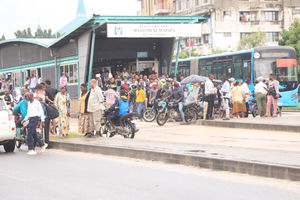MPs’ concern on industrial growth

What you need to know:
Requesting Parliament to endorse his ministry’s Sh122 billion 2017/18 budget, Industry, Trade and Investment minister Charles Mwijage said Dr John Magufuli’s administration hit the ground running in November 2015 with the agenda of turning Tanzania into an industrialised and middle income country by 2025.
Dodoma. The government said in Parliament yesterday that it has registered 393 large scale industrial projects valued at $2.36 billion (Sh5.1 trillion) during the past 18 months, but the Opposition warned that the current declining contribution from the industrial sector to the national economy could derail the industrialisation.
Requesting Parliament to endorse his ministry’s Sh122 billion 2017/18 budget, Industry, Trade and Investment minister Charles Mwijage said Dr John Magufuli’s administration hit the ground running in November 2015 with the agenda of turning Tanzania into an industrialised and middle income country by 2025.
Out of Sh122 billion that he asked Parliament to approve, Sh80 billion is earmarked for development projects while Sh42 billion is for recurrent expenditure.
But the emphasis of his budget speech yesterday was on the investment projects registered in the past two years. “Since the Fifth Phase Government assumed office in November 2015, a total of 393 projects of large scale industries with a capital flow $2.36 billion (some Sh5.1 trillion) have been registered by Tanzania Investment Centre (TIC),” Mr Mwijage said.
The minister further said the projects are in different execution phases, with some in final stages of implementation. When operational, the industries should create a total of 38,862 jobs, he noted.
“Between July 2016 and March 2017, TIC registered 242 new investment projects worth $2 billion, out of which 170 are large industries expecting to create 17,385 jobs. A total of 1,843 small scale industries have also been registered across the country,” he said adding:
“Manufacturing sector created 146,892 jobs in 2016 compared to 139,895 in 2015. The sector also grew by 7.8 per cent in 2016 compared to 6.5 per cent in 2015. The sector also contributed to 5.1 per cent of gross domestic product (GDP) in 2016, compared to 5.2 per cent in 2015.”
But tabling the Opposition budget, the Shadow Minister for Industry, Mr Anthony Komu (Moshi Rural-Chadema), said the government’s promise to industrialise the economy in eight years was unrealistic.
He challenged the government to explain to Tanzanians why they promise to build an industrial economy while the relevant ministry receives only 0.36 per cent of the entire government budget for the 2017/18 fiscal year.”
Mr Komu noted that for Tanzania to become a middle income and industrialised nation by 2025 the manufacturing sector should contribute to an average of 40 per cent of the GDP.
“Today, only eight years to 2025, the manufacturing industry only contributes 5.2 per cent of GDP, according to the National Five Year Development Plan 2016/17-2020/21,” he said adding :
“Even if President Magufuli would remain in power for the next eight years, he’s not going to achieve the industrialisation dream judging from the current pace.”
Available data, however, paint a gloomy picture of the performance of the industrial sector during the past months, with the Bank of Tanzania (BoT) showing that the value of manufactured goods exports dropped by a cool 37.5 per cent to $879.7 million during the year ending March 2017 from $1.408 billion during the year ending March 2016.
This is the lowest level to have been attained in a period of six years since manufactured exports crossed the $1 billion mark in the 2010 calendar year.
The BoT reported a three per cent drop in the value of exports of goods and services during the year ending March 2017 to $8,921.7 million.
Similarly, importation of capital goods—which are meant to stimulate industrial production in the country— went down 16.7 per cent during the year ending March 2017 to $2.84 billion from $3.4 billion during the year ending March 2016.
Mr Mwijage had told Parliament that a recent census showed the country has a total of 49,243 factories, 85 per cent of which are very small industries; small industries account for 14 per cent, middle industries (0.35 per cent) and the big ones (0.5 per cent).
However, Mr Komu told Parliament that the statistics do not paint a good picture for the country’s industrial growth.
“A total of 96.5 per cent of all industries in the country are small industries, each employing between one and nine individuals, and 3.5 per cent employing from 10 individuals and beyond. We would be lying to ourselves if this is what we call an industrial journey that we want to take as a nation.”
Some of the development projects to be undertaken during the next fiscal year as projects to build industry-economy base according to Mr Mwijage, are establishment of the special economic zones, developing the industrial area in Kibaha (Tamco), developing researches for the development of industries, and to increase the capital in the National Entrepreneurship Development Fund (NEDF).




